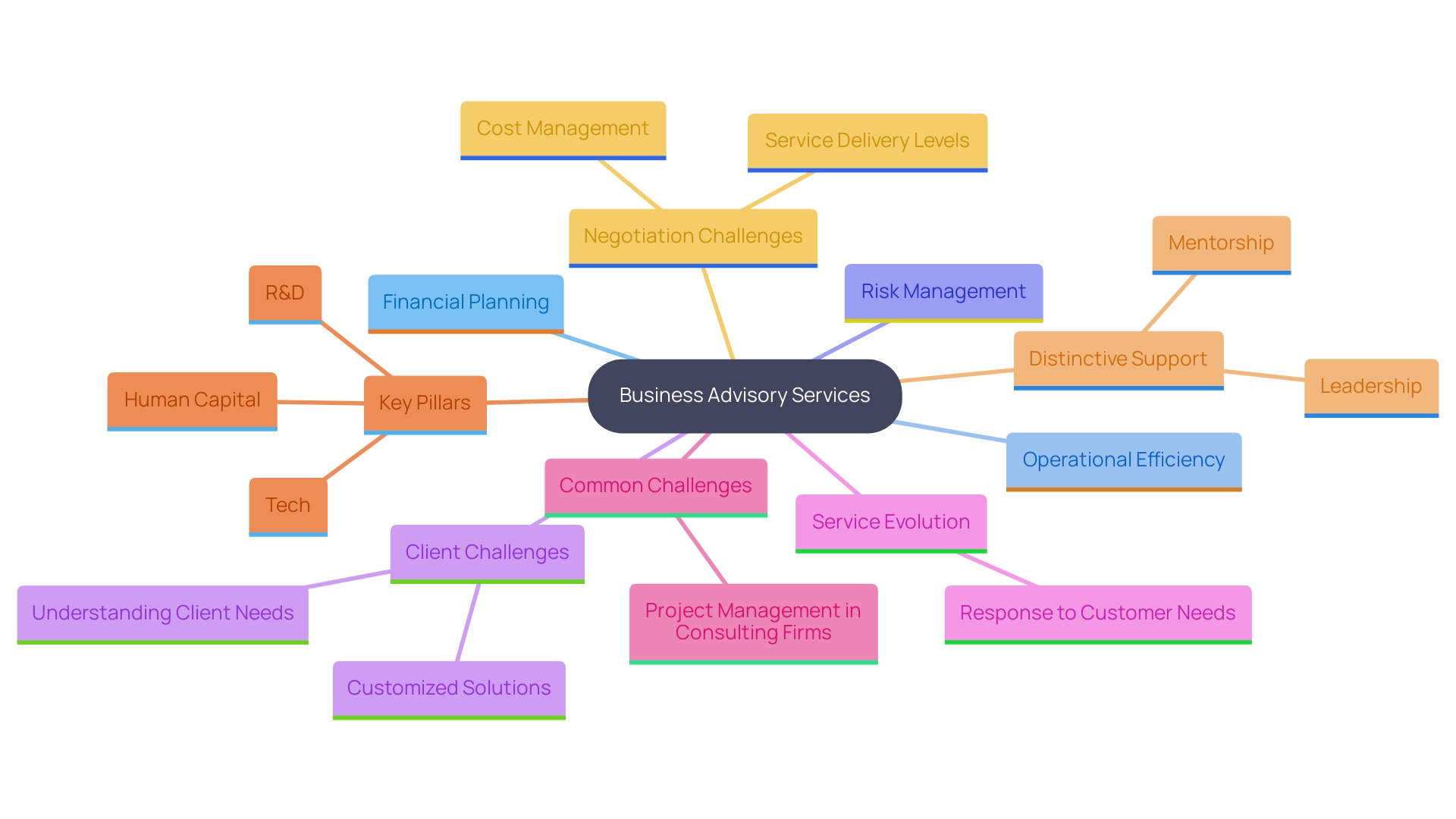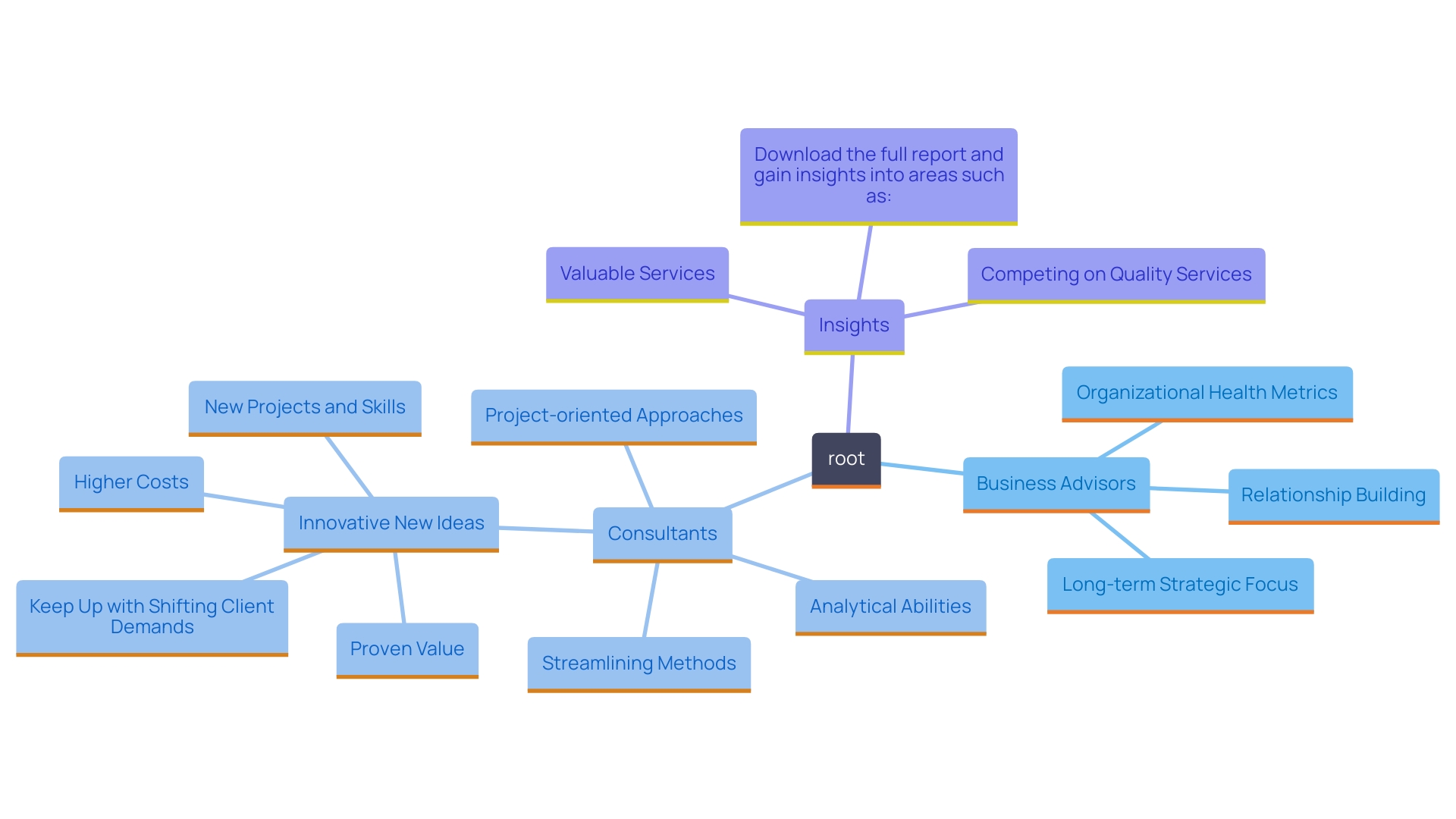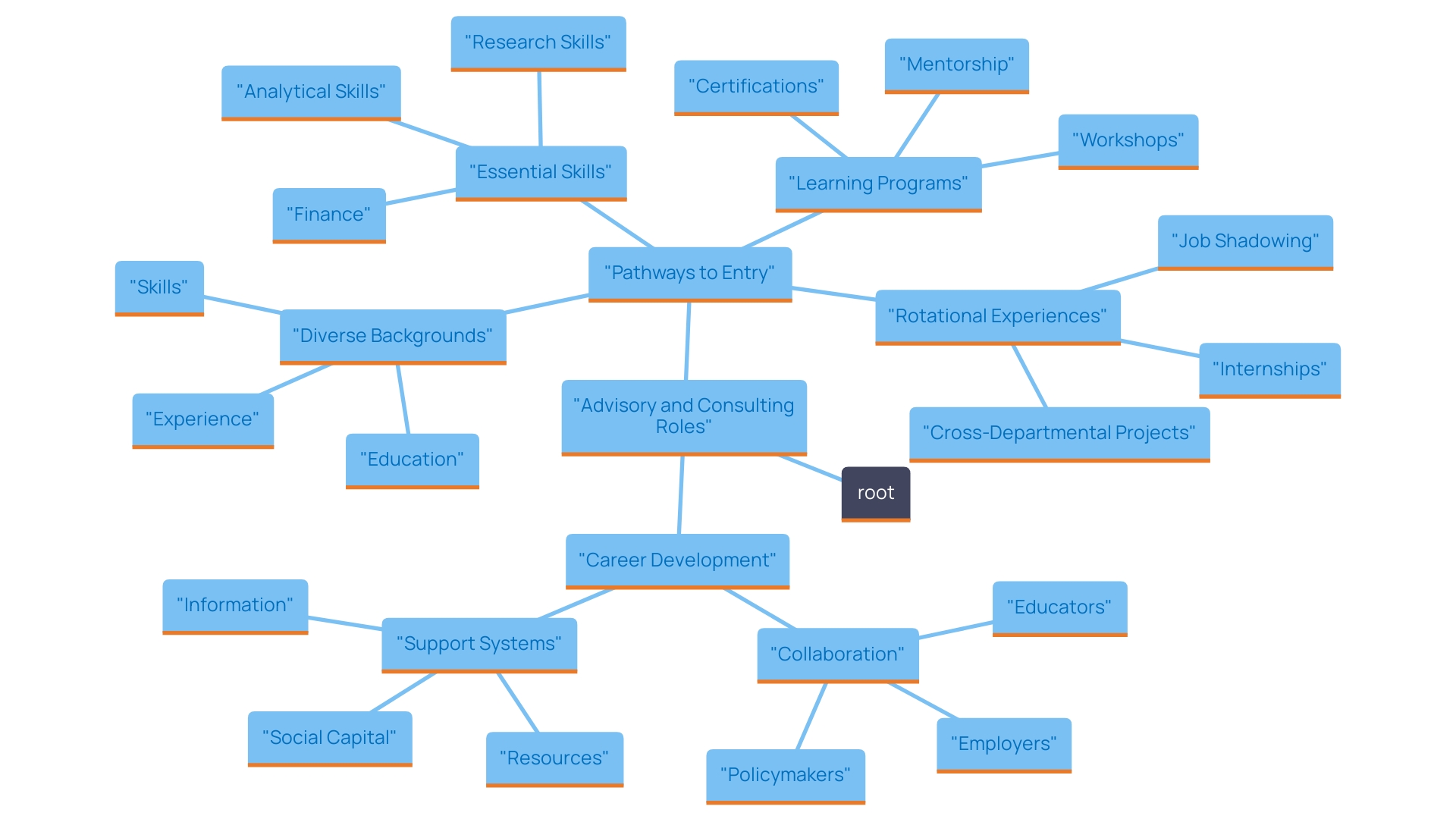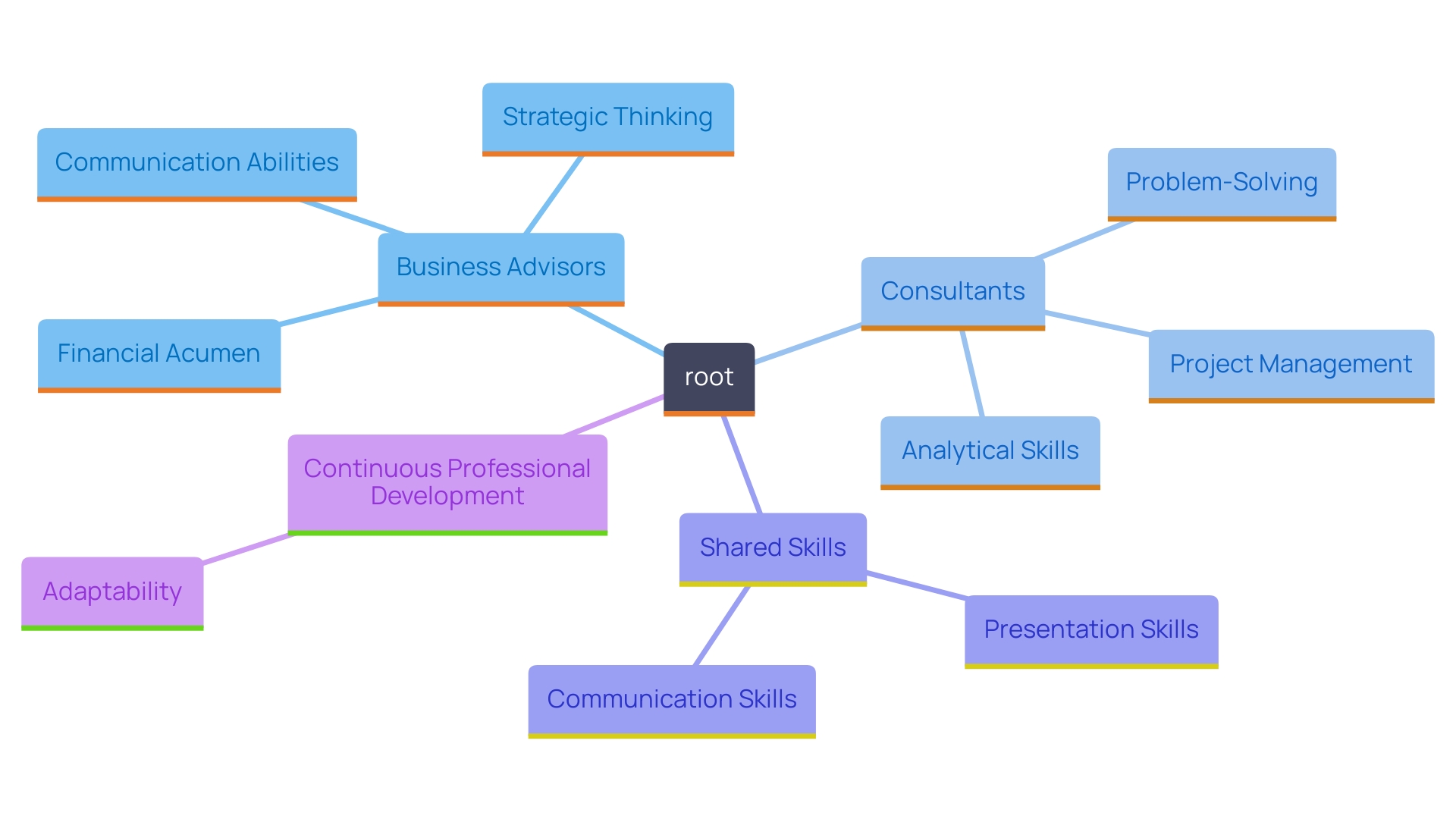Introduction
In the ever-evolving landscape of business, organizations are increasingly turning to advisory services to navigate the complexities of performance enhancement and strategic goal achievement. These services extend far beyond traditional consulting, encompassing a wide array of activities from financial planning to risk management. By harnessing the expertise of seasoned professionals across various domains, businesses can receive tailored, actionable insights that drive sustainable growth.
As firms adapt to the dynamic needs of their clients, the distinction between business advisory and consulting becomes critical, highlighting the unique approaches each takes in fostering long-term partnerships versus addressing immediate challenges. This article delves into the intricacies of business advisory services, compares them with consulting roles, explores career pathways, and outlines the essential skills required for success in these fields.
Understanding Business Advisory Services
play a pivotal role in steering organizations towards enhanced performance and the achievement of strategic objectives. These services encompass a broad spectrum of activities, including but not limited to , , and comprehensive risk management. By leveraging the expertise of consultants from diverse fields such as finance, human resources, management, and strategy, advisors are uniquely positioned to conduct thorough assessments that lay the groundwork for tailored, actionable recommendations.
Effective cooperation with customers is at the heart of business advisory services. Advisors immerse themselves in understanding the unique challenges faced by those they serve, allowing them to develop customized solutions that foster sustainable growth. The recent push for investment in servicing and transformation teams by firms like 7IM highlights the industry's dedication to evolving in response to customer needs. As Russell Lancaster, MD of Platform and Intermediary Partnerships at 7IM, noted, the enhancements made to their platform are aimed at better serving advisers and customers, illustrating the importance of adapting services to meet the dynamic landscape of expectations.
Moreover, the successful management of projects is a critical challenge for consulting firms, necessitating creative solutions to deliver results effectively. This challenge is not unique to any single firm but is a common thread across the industry. By addressing these project management hurdles, consulting firms can optimize their operations and deliver significant value to customers, ultimately helping them navigate the complexities of today's business environment.

Comparing Business Advisory and Consulting: Key Differences and Similarities
both aim to enhance organizational performance, yet they employ distinct approaches and scopes. Business advisors typically focus on fostering , placing significant emphasis on relationship-building and ongoing collaboration with stakeholders. This often results in advisors becoming integral partners within the customer's operational framework, offering insights that drive sustainable growth. On the other hand, consultants usually tackle specific projects or address pressing issues, providing expert solutions that often yield short-term results. For instance, consultancies like McKinsey have pioneered a data-driven science of teamwork, enabling real-time analysis and interventions to enhance team performance—a clear demonstration of consulting's project-oriented nature.
Both roles require a deep comprehension of the customer's industry environment, along with strong analytical abilities to guide strategic decision-making. As noted by Shannon Jennings, PsyD, organizational leaders frequently encounter challenges rooted in human behavior, making it crucial for both advisors and consultants to develop trust and rapport with their clients. Those with backgrounds in psychology can leverage their skills to identify relational obstacles and foster growth, enhancing the effectiveness of their consulting engagements.
Furthermore, the evolving nature of underscores the need for a nuanced approach. Research indicates that organizations with strong health metrics—those aligned around common visions and capable of strategic renewal—experience significantly higher shareholder returns. Thus, regardless of the position, the ability to analyze and adapt strategies based on becomes imperative for driving long-term success.

Career Pathways: Transitioning into Business Advisory and Consulting
Transitioning into advisory or consulting offers multiple pathways, each presenting unique challenges and opportunities. For professionals aiming for roles in , a robust foundation in finance, accounting, or specific industry knowledge is often essential. These experts are tasked with navigating complex and providing strategic insights that can significantly impact an organization's performance. Furthermore, providing organized learning programs can prepare employees with the essential abilities to thrive in advisory services, aligning their development with the firm’s strategic goals.
On the other hand, consultants may come from diverse backgrounds such as management, IT, or marketing, reflecting the broad spectrum of available today. This versatility is crucial as consultants frequently encounter that demand innovative and practical solutions. The ability to dissect problems, identify root causes, and craft effective strategies is invaluable. As W. Edwards Deming famously stated, 'In God we trust, all others bring data.' This emphasizes the importance of analytical abilities in consulting, where data-driven insights support strategic recommendations.
Furthermore, rotational programs within firms can provide employees with a wealth of experience across departments, allowing them to pinpoint their passions and strengths. This exposure is not only advantageous for personal career advancement but also aids the organization’s wider objectives by nurturing well-rounded professionals who can contribute significantly in their positions. By fostering an environment where mentoring and shadowing thrive, firms can enhance career development, empowering employees to tackle new challenges and stimulating innovative problem-solving capabilities. Both pathways can lead to fulfilling careers; however, the competencies required can vary significantly based on the specific demands of the advisory or consulting role.

Skills and Competencies in Business Advisory vs. Consulting
Successful have a distinctive combination of essential abilities that allow them to manage the intricacies of relationships and offer valuable insights. is essential, enabling advisors to analyze financial data and assist individuals in making informed decisions that enhance profitability and sustainability. Strategic thinking is another essential ability, as it empowers advisors to develop comprehensive, forward-looking plans that align with clients' long-term objectives. Furthermore, strong communication abilities are crucial for establishing trust and rapport, nurturing collaborative partnerships that can propel organizational success over time.
In contrast, consultants are often required to possess a distinct set of abilities tailored to their project-based roles. Analytical abilities are essential, as consultants need to interpret data, present findings, and create actionable solutions to tackle specific organizational challenges. Successful enable them to identify root causes and propose effective interventions. Additionally, expertise in is vital, as consultants oversee initiatives with defined outcomes, ensuring that projects are delivered on time and within budget.
Both advisors and consultants share a common necessity for robust communication and presentation skills. The capability to communicate intricate information in a clear and captivating way is essential in both areas, as it aids individuals in grasping the implications of data and the reasoning behind strategic suggestions. As businesses increasingly depend on data-driven insights, experts in these positions must enhance their capabilities in data analysis and financial modeling, ensuring they can deliver high-quality results that meet clients' evolving needs. Continuous professional development and adaptability in a dynamic environment are imperative for maintaining relevance and effectiveness in these competitive roles.

Conclusion
Business advisory services are essential drivers of organizational success, providing a comprehensive range of support that goes beyond traditional consulting. By focusing on long-term strategic partnerships and personalized solutions, advisors help businesses navigate complex challenges and achieve sustainable growth. The distinction between advisory and consulting roles is pivotal; while advisors cultivate ongoing relationships and holistic strategies, consultants often deliver targeted solutions for immediate issues.
Understanding these differences is crucial for organizations seeking to leverage external expertise effectively.
Transitioning into these fields requires a diverse skill set, with business advisors needing strong financial and strategic capabilities, while consultants must excel in analytical problem-solving and project management. Both roles emphasize the importance of communication and relationship-building, as fostering trust is vital for long-term success. As industries evolve, so too must the professionals within them, necessitating continuous learning and adaptability to meet the changing demands of clients.
In conclusion, embracing the unique strengths of business advisory services can significantly enhance an organization’s ability to thrive in a competitive landscape. By recognizing the value of tailored insights and strategic partnerships, companies can position themselves for sustained success. As the business environment continues to shift, leveraging the right expertise will be key to navigating challenges and seizing opportunities for growth.
Frequently Asked Questions
What are business advisory services?
Business advisory services are designed to enhance organizational performance and help achieve strategic objectives. They include activities such as financial planning, operational efficiency, and risk management, leveraging the expertise of consultants from various fields.
How do business advisors work with clients?
Business advisors collaborate closely with clients to understand their unique challenges, allowing them to develop customized solutions that promote sustainable growth. This cooperation is essential for creating actionable recommendations.
What is the difference between business advisory and consulting roles?
Business advisors focus on long-term strategic partnerships and relationship-building, while consultants typically address specific projects or pressing issues, often yielding short-term results. Advisors become integral partners within the client's operational framework, whereas consultants provide expert solutions for immediate challenges.
What skills are essential for successful business advisors?
Successful business advisors need financial acumen, strategic thinking, and strong communication skills. These abilities help them analyze financial data, develop comprehensive plans, and build trust with clients.
What skills are essential for successful consultants?
Consultants require analytical abilities, problem-solving skills, and project management expertise. They must interpret data, create actionable solutions, and oversee projects to ensure timely and budget-compliant delivery.
Why is organizational health important in advisory and consulting?
Organizations with strong health metrics, aligned around common visions and capable of strategic renewal, tend to experience higher shareholder returns. Both advisors and consultants must analyze and adapt strategies based on organizational health data for long-term success.
What pathways exist for transitioning into advisory or consulting roles?
Professionals can enter advisory roles with a strong foundation in finance, accounting, or specific industry knowledge. Consultants may come from diverse backgrounds such as management, IT, or marketing. Both paths benefit from organized learning programs and mentoring.
How do continuous professional development and adaptability impact advisory and consulting roles?
Continuous professional development and adaptability are crucial for both advisors and consultants to maintain relevance and effectiveness in a dynamic environment, especially as businesses increasingly rely on data-driven insights.




